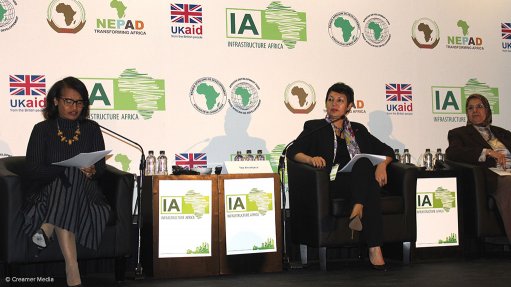
Geraldine Joslyn Fraser-Moleketi, Tas Anvaripour and Dr Elham Mahmood Ahmed Ibrahim
Infrastructure sharing can greatly assist in developing African countries and can also save billions of dollars in costs, African Union Commission (AUC) infrastructure and energy commissioner Dr Elham Mahmood Ahmed Ibrahim told delegates at the Infrastructure Africa conference, in Johannesburg, on Thursday.
She noted that the AUC’s Programme for Infrastructure Development in Africa (PIDA) provided a common framework for African stakeholders to build the infrastructure necessary for more integrated transport, energy, information and communication technology and transboundary water networks to boost trade, spark growth and create jobs.
"PIDA is allowing African countries to be the primary beneficiaries to meet forecast demand for infrastructure services and boost their competitiveness," Ibrahim stated.
She explained that the main objective of PIDA was to increase the use of resources to enable African stakeholders to speak with one voice, on the basis of a common agenda and common vision for infrastructure development.
African Development Bank (AfDB) gender special envoy Geraldine Joslyn Fraser-Moleketi, meanwhile, stressed that addressing inequalities, whether gender-related or otherwise was not just a moral imperative, but "absolutely necessary" for sustainable development on the continent.
“Girls and women are living infrastructure. However, significant disparities in remuneration, choice of trade and job security persist. Particularly, African women perform a disproportionately higher share of unpaid or unproductive labour, given that women’s work days are longer than average, up to 50% longer in some countries.”
Fraser-Moleketi told delegates that similar gender disparities were evident in leadership roles, human development and legal status and rights.
"Addressing these disparities will deliver important development benefits for the continent," she emphasised.
Additionally, Fraser-Moleketi said infrastructure was the DNA of modern life as it affected the competitiveness of countries and the African continent as a whole. She described infrastructure as the invisible thread that bound the continent together.
She further stated that it was for these reasons that the AfDB was "investing heavily" in African infrastructure projects. The AfDB had invested in 114 infrastructure projects across 44 African countries at a value of about $11.6-billion including the establishment of 26 nonstop border crossings.
She lamented, however, that only 19% of the people on the continent had access to electricity; therefore, it was crucial that more large-scale power projects were completed across the continent.
Private equity investment firm Abraaj Group partner Tas Anvaripour told conference delegates that public–private partnerships were critically important in addressing the challenges of infrastructural development in Africa.
She said Africa's infrastructure needs were massive, with the continent needing to invest an estimated $100-billion a year to meet its transport, energy and water infrastructure needs.
"It is impossible for African governments to raise these funds themselves. It is, therefore, crucial that the private sector comes to the party. At the same time, governments need to ensure they create business environments that are attractive for companies to invest in these projects on a long-term basis," she remarked.